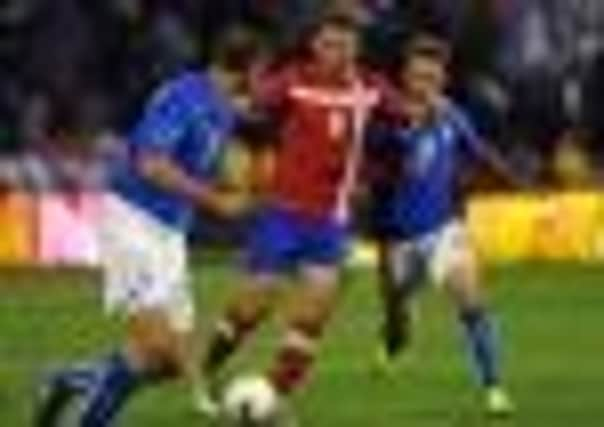Serbia give impression of a team poised to flourish


But that’s the point. Serbia, a country of some eight million people, was the largest single component of the former Yugoslavia. And Yugoslavia was a force to be reckoned with for much of its life as a footballing entity.
Sooner or later, you feel, the Serbs will get it right, recover what went missing when Yugoslavia began to break up, and start putting a few good results together. You can only hope for Scotland’s sake that it’s later rather than sooner.
Advertisement
Hide AdAdvertisement
Hide AdAfter a joint Serbia and Montenegro team qualified for the 2006 World Cup ahead of Spain, the first tournament in which Serbia competed on its own was the European Championship of 2008. They finished third in their qualifying group behind Poland and Portugal.
Faring better two years later, they reached the finals of the World Cup in South Africa, where they recorded the best result of their short history so far – a 1-0 win over Germany. That shock followed a loss to Ghana, and those two games left them needing just a point in their last group match against Australia to qualify for the latter stages. They lost 2-1.
If that 2010 tournament was a high, the qualifiers for Euro 2012 definitely represented a low. Group C began comfortably enough with a 3-0 win in the Faroe Islands, but a 1-1 draw with Slovenia spelled the end of Radomir Antic’s tenure as coach.
The reign of his successor, Vladimir Petrovic, got off to a poor start with a home defeat by Estonia. That was followed by an abandoned match in Genoa which was awarded to the Italians because of crowd trouble in the away end.
Despite those reverses, Serbia went into the last qualifying game needing just a draw in Slovenia to claim a play-off place. They lost 1-0, Estonia qualified instead of them, and Petrovic was sacked.
Given Serbia’s size, you would be hard pressed to define it as a sleeping giant. Nonetheless, those results came as a shock to a country which is acknowledged by Fifa as the inheritor of Yugoslavia’s record – a record which includes several substantial achievements.
Between 1954 and 1990, for example, Yugoslavia reached the quarter-finals of the World Cup three times, and also made it as far as fourth place, in 1962, when the tournament was held in Chile. The Yugoslavs also came fourth in 1976, but had two better performances, being runners-up in 1960 and again eight years later.
But while Serbia is officially the footballing continuation of Yugoslavia, Croatia – also in our World Cup qualifying group – has arguably a better case for being considered as the real successor. Third at the 1998 World Cup, and Euro quarter-finalists in 1996 and 2008, Croatia has done remarkably well for a country of a little over four million people. Certainly Scotland, with its five and a bit million, can only look at such success with envy.
Advertisement
Hide AdAdvertisement
Hide AdSo why is there such a disparity between the results of the two former partners? In any one generation it could simply be the case that Croatia was blessed with a more gifted group of players, but there is no reason that such a difference, even if it did exist, should persist year after year.
There was a unified coaching system throughout Yugoslavia, and in the years immediately before its dissolution the national team included more than a few talented Serbs. So instead of there being any innate superiority on the part of the Croatians, at least part of the answer must lie in the political mood within the two countries.
Having wrested itself away from its senior partner in a bloody civil war, Croatia was born free-spirited, independent-minded and outward-looking.
By contrast, Serbia, having been bombed by Nato and treated as a pariah state for some years after hostilities had ended, was left feeling isolated and introverted. Domestically it remained turbulent, with outbreaks of football hooliganism such as the one in Genoa often having political overtones. In more recent years, individual sportsmen and women have developed an immunity to that mindset and been able to succeed on the world stage – notably in tennis, in which Novak Djokovic, Jelena Jankovic and Ana Ivanovic are all former world No 1s. And that trend is spreading slowly to football, with a growing number of Serbs plying their trades in the best leagues in Europe.
League football in Serbia itself still has its problems, but the fortunes of the national team need not be determined by that.
New manager Sinisa Mihajlovic has yet to win after four matches in charge, but Scotland would be well advised to avoid complacency. A real revival can surely not be too long in coming.